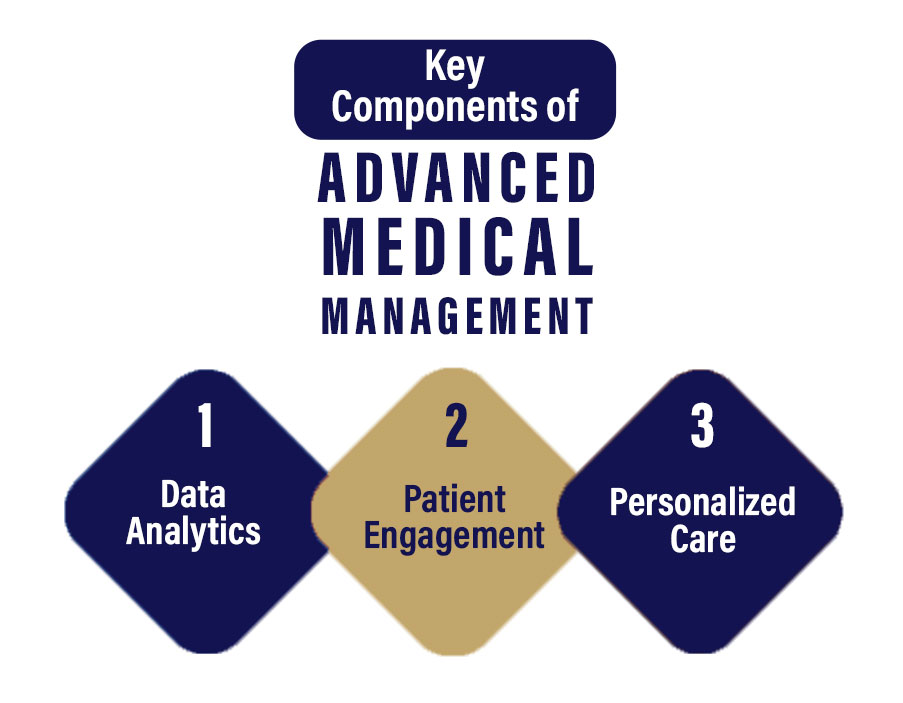Advanced medical management revolutionizes healthcare delivery and patient experience in today’s fast-changing healthcare market. As this shift continues, advanced medical management solutions are needed more than ever. This blog explores sophisticated medical management and its vital role in healthcare.
We’ll review the essential factors and new solutions that enhance patient outcomes and streamline healthcare. Discover the extraordinary influence of improved medical management in modern healthcare with us.
What is Advanced Medical Management
Advanced medical management uses new methods, technology, and practices to improve patient care, healthcare outcomes, and resource allocation. Data analytics, telemedicine, patient interaction technologies, and tailored care are used to provide high-quality, cost-effective care.
Patient and provider benefits from this management are many. It helps doctors give more personalized and focused care, improving patient outcomes. Optimizing resource usage and avoiding needless treatments lowers healthcare expenditures. It improves patient experience by making care accessible and empowering patients to manage their health.
This management addresses healthcare industry issues such as inefficient care coordination, lack of timely and appropriate healthcare information, and escalating healthcare expenditures. Healthcare professionals can overcome these hurdles and provide better patient care by using modern medical management technologies.
Key Components of Advanced Medical Management

Data Analytics
Healthcare management relies on data analytics to gain insights from massive healthcare data. Providers can discover trends, forecast patient outcomes, and make better decisions. Data analytics helps healthcare firms improve operations, patient care, and costs.
Patient Engagement
It requires patient engagement. This also empowers patients to participate in their healthcare through education, communication, and collaboration. Patient portals and mobile health apps let patients access their health records, contact with doctors, and take charge of their health.
Personalized Care
Patient preferences are considered when providing personalized care. Precision medicine and genomics are crucial to this medical management for focused and successful treatments. Healthcare providers can create tailored treatment programs with better outcomes by understanding each patient’s genetics and health.
Advanced Medical Management in Action
Remote patient monitoring for heart failure patients is an example of modern medical care in action. Healthcare practitioners were able to respond quickly to early indicators of deterioration by remotely monitoring patients’ vital signs and symptoms, improving outcomes and reducing hospitalizations.
Using a data analytics platform to better population health management is another advanced medical management success story. Healthcare providers identified high-risk individuals and focused actions to enhance their health by evaluating population-level data. This saved expenses and increased population health.
Future Trends in Advanced Medical Management
The future holds various trends that could change healthcare delivery. From telemedicine to tailored treatment regimens, these trends will make healthcare more accessible, efficient, and effective. So let’s get into it.
Artificial Intelligence (AI)
AI will change this management with more accurate diagnosis, individualized treatment regimens, and predictive analytics. AI can evaluate complex medical data like imaging scans and genetic information to help doctors make better judgments.
Telemedicine
Telemedicine will become an important part of sophisticated medical management, especially in remote and disadvantaged locations. Telemedicine advances like virtual reality and remote monitoring equipment will help providers give high-quality care to patients anywhere.
Remote Patient Monitoring
Remote patient monitoring lets doctors check patients’ health remotely. The development of wearable devices and sensors that continuously monitor vital signs and other health data will expand this trend. Remote patient monitoring can help doctors spot health issues early and intervene.
Implementing Advanced Medical Management Solutions In organizations
- Train and educate healthcare providers about modern medical management technology and their benefits.
- Technology partnerships can help healthcare providers use the latest medical management technologies.
- Provide patients with health information and involve them in decision-making to engage them in their healthcare.
- Assess and change management methods to maximize their effects.
Challenges and Solutions
- Protect patient data and comply with HIPAA using strong security measures.
- Existing-system integration ensure modern medical management solutions connect easily with EHRs and other healthcare IT infrastructure.
- The management solutions can save money and enhance outcomes over time, outweighing the original expenditure.
Conclusion
Advanced medical management enhances patient outcomes, healthcare delivery, and resource optimization. We explored how modern medical management data analytics, patient contact, and individualized treatment handle healthcare sector concerns.
AI, telemedicine, and remote patient monitoring will strengthen sophisticated medical management and increase healthcare delivery. Contact us to learn more about current medical management systems and how we can help you adopt them. We can improve global healthcare and patient lives by cooperating.
FAQs
This medical management uses new methods and technologies to improve patient care and results. Data analytics, patient interaction, and tailored treatment are integrated.
Medical management helps doctors provide more individualized and effective care, improving patient outcomes. It lowers healthcare expenditures and improves patient satisfaction.
It includes data analytics, patient engagement tools, and personalized care approaches.
This helps doctors provide more targeted and efficient care, improving patient outcomes. Optimizing resource usage and avoiding needless treatments lowers healthcare expenditures.
Future trends include using AI to better diagnosis and treatment planning, telemedicine for distant care, and remote patient monitoring for health status outside of typical healthcare settings.

